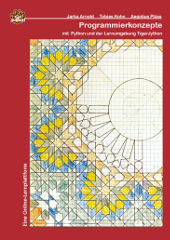Go-Spiel (Datentypen, Variablen und Ausdrücke)
Im Go-Spiel kreuzen sich 19 horizontale mit 19 vertikalen Linien. Auf die 361 Schnittpunkte können schwarze bzw. weiße Steine gesetzt werden. Jeder dieser Kreuzpunkte hat nach jedem Zug einen der drei Zustände schwarz, weiß oder leer (noch unbesetzt). Eine Spielposition besteht demnach aus 361 Punkten, wobei jeder Punkt entweder schwarz, weiß oder leer ist.
Modellieren Sie eine Go-Spielposition und versuchen Sie, mit möglichst wenig Speicher, die gesamte Position festzuhalten. Wer schafft es unter 80 Byte?
Tipp: Zahlensysteme.
0 Kommentare
1 Lösung(en)
PROGRAM GO;
(*
Idea: Each tile is a tri-state (one of 0/1/2). Hence, we can use a
tri-ary representation. For simplicity, we write always 5 tiles
into one byte. This works because 3^5 <= 2^8. For 19 x 19 tiles, one
needs 19*19/5 = 73 bytes.
One could do with 72 bytes, as the Shannon entropy is only 71.5.
However, then one would have to represent the whole board as one
BIGINT (even using INT64 does not help, as 64/log_2(3) = 40.4).
*)
CONST
N = 19; // 19 x 19 board
L = 73; // # bytes needed, 19*19 / floor(8/log_2(3))
TYPE
TBoard = ARRAY [0..N-1,0..N-1] OF Byte; // 0=empty, 1=black, 2=white
TMem = ARRAY [0..L-1] OF Byte;
PROCEDURE RandomBoard (VAR board : TBoard);
// Fill board randomly
VAR i,j : INTEGER;
BEGIN
Randomize;
FOR i := Low(board) TO High(board) DO
FOR j := Low(board[i]) to High(Board[i]) DO
board[i,j] := Random(3);
END;
PROCEDURE PrintBoard (CONST board : TBoard);
// Print board to console
VAR
i,j : INTEGER;
str : STRING;
BEGIN
str := '-BW'; // Characters for empty / black / white
FOR i := Low(board) TO High(board) DO
BEGIN
FOR j := Low(board[i]) to High(Board[i]) DO
Write(' ',str[Board[i,j]+1],' ');
Writeln;
END;
END;
PROCEDURE CompressBoard (CONST board : TBoard; VAR mem : TMem);
// Compress board into mem.
// Group 5 cells, store cell[1]*1 + cell[2]*3 + cell[3]*0 + ...
// ... + cell[5]*81
VAR i,j,k,base : INTEGER;
BEGIN
k := -1; // index into mem
base := 1000; // start new memory cell
FOR i := Low(board) TO High(board) DO
FOR j := Low(board[i]) to High(Board[i]) DO
BEGIN
IF base*3 > 256 THEN // no space left, use next cell
BEGIN
Inc(k); mem[k] := 0; base := 1; // initialize next cell
END;
Inc(mem[k],board[i,j]*base); // poke current tile into current cell
base := base * 3; // base 3
END;
END;
PROCEDURE UncompressBoard (CONST mem : TMem; VAR board : TBoard);
// Uncompress mem into board
// Each memory cell contains 5 tiles
VAR i,j,k,base : INTEGER;
BEGIN
k := -1;
base := 1000;
FOR i := Low(board) TO High(board) DO
FOR j := Low(board[i]) to High(Board[i]) DO
BEGIN
IF base*3 > 256 THEN
BEGIN
Inc(k); base := 1;
END;
board[i,j] := (mem[k] div base) mod 3;
base := base * 3;
END;
END;
VAR
b1,b2 : TBoard; // two boards
m : TMem; // one memory
BEGIN
RandomBoard(b1); // b1 is random
Writeln('b1'); // output
PrintBoard(b1);
CompressBoard(b1,m); // b1 -> memory
UncompressBoard(m,b2); // memory -> b2
Writeln('b2'); // output b2, hopefully same as b1 :-)
PrintBoard(b2);
END.
Lösung von: Martin Hirt (ETH Zürich)
Verifikation/Checksumme:
Eine Position kann als 361stellige Zahl im 3er-System aufgefasst werden. Mit einer 361stelligen Zahl im 3er-System können alle Zahlen von 0 bis 3361-1 dargestellt werden. Das sind 1.74*10172 Zahlen. Der Zweierlogarithmus davon liefert 572.2. Somit sind 573 Binärziffern (= 72 Byte) nötig, um jede Zahl von 0 bis 3361-1 darzustellen. Ihr Programm könnte dazu eine Umwandlung vom 3er- ins 2er-System und zurück verwenden.
Aktionen
Neue Lösung hinzufügen
Bewertung
Durchschnittliche Bewertung:
Meta
| Zeit: | 0.25 |
| Schwierigkeit: | k.A. |
| Webcode: | 9c7m-tjxk |
| Autor: | Philipp G. Freimann (BBW (Berufsbildungsschule Winterthur) https://www.bbw.ch) |




